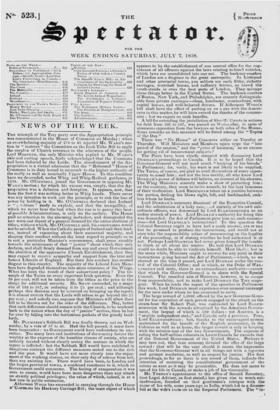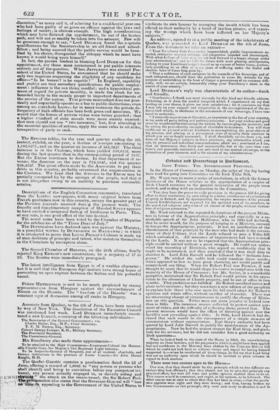NEWS OF THE WEEK.
THE triumph of the Tory party over the Appropriation principle was consummated in the House of Commons on Monday ; when an overwhelming majority of 270 to 46 rejected Mr. WARD'S mo- tion to " instruct " the Committee on the Irish Tithe Bill to apply the surplus of Church revenues to the education of the people. Lord 11FloapEnr, the only Minister who replied to Mr. WARD'S alile and cutting speech, fairly acknowledged that the Commons had been defeated by the Lords. The abandonment of the Ap- propriation is a virtual admission that the " Reformed " House of Commons is in duty bound to succumb to the higher authority of the really as well as nominally Upper House. To this condition have we descended, under Whig and Whig-Radical guidance, in 1838. Mr. O'Costsratt. joined the Government in opposing Mr. WARD'S motion ; for which his excuse was, simply. that the Ap- propriation was a &logien and deception. It appears, now, that from the first it was nothing better in Whig hands. There never etas any intention to work out the principle, or to risk the loss of power by holding to it. Mr. O'CONNELL declared that Ireland " volcano " ready to explode, and that the tranquillity, of which we never hear the last when the cue is to praise this best- of-possible Administrations, is only on the surface. The House paid no attention to the alarming metaphor, and disregarded the now worn-out threat of a general demand for the entire abolition of tithes, without which, Mr.O'CONNELL said, his countrymen would not be sat istied. W hen the Catholic people of Ireland and their lead- ers, instead of vapouring about their numerical majority, and shaping their conduct without the least regard to principle so as to suit a particular Minister's convenience, shall press steadily towards the attainment of that " justice " about which they only declaim, and shall firmly demand from any and every Government the abolition of the oppressive Church Establishment, then they may expect to receive sympathy and support from the true and honest Liberals of England. But their late conduct has created disgust in this country. The majority of the Liberal Irish Mem- bers have degraded themselves into mere creatures of the Whigs. What has been the result of their subservient policy ? The tri- umph of the Tories on every important Irish question. Even the 30 per cent. will not be taken from the tithes as the price to the clergy for additional security. Mr. SHAW succeeded, by a majo- rity of 18S to 167, in reducing it to 25 per cent.; and although perhaps this decision may be reversed on bringing up the report, it is almost certain that the Lords will refuse to go beyond the 25
per cent.; and nobody can suppose that Ministers will allow their bill to be thrown out for the sake of the difference. Nay, better that such difference should remain with the Church, to be rendered back to the nation when the day of "justice" arrives, than be lest for ever by fal,fing into the bottomless pockets of the greedy land- lords.
Mr. PLUMPTRE'S Sabbath Bill was finally thrown out on Wed- nesday, by a vote of 57 to 45. Had the bill passed, it must have been inoperative : no Government could have. undertaken its exe-
cution. Too many laws and institutions of the country favour the wealthy at the expense of the humbler classes of society, who are unfairly treated without clearly seeing the manner in which the injury is inflicted : but the Sabbath Bill would have exhibited in dangerous contrast the different measures meted out to the rich and the poor. It would have cut more closely into the enjoy- ment of the working classes, on their only day of release from toil, than any existing law. There would have been, in London and
the larger; provincial towns, a combined resistance to it, which no Government could encounter. The feeling of exasperation it was sure to create, would have been more dangerous than any attack on strictly political privileges; the value of which, indeed, is at a low rate in public estimation. Alderman Wool) has succeeded in carrying through the House e Commons his Hackney Carriage Bill; the main object of which
appears to be the establishment of one central office for the cog- nizance of all offences against the laws relating to hired vehicles, which laws are consolidated into one act. The hackney'-coaches of London are a disgrace to the great metropolis. In Liverpool and other provincial towns, you seldom see such filthy, ricketty carriages, wretched horses, and ruffianly drivers, as crowd the coach-stands in even the best parts of London. They manage these things better in the United States. The hackney-coaches of Boston, New York, and Philadelphia, are scarcely distinguish- able from private carriages—clean, handsome, commodious, with capital horses, and well-behaved drivers. If Alderman Woon's bill shall have the effect of putting us on a par with the Ameri- cans in this matter, he will have earned the thanks of the commu- nity : but we expect no such benefits.
A bill for extending the jurisdiction of Sheriffs' Courts in actions for debt from 201. to 50/., was passed on Wednesday, in spite of strenuous opposition from the lawyers on both sides of the House. Some remarks on this measure will be found among the "Topics of the Day." There was " No House" of Commons either on Tuesday or Thursday. Will Ministers and Members again urge the " late period of the session," and the "press of business," as an excuse for getting rid of inconvenient subjects ? The Peers have been chiefly occupied with discussing Lord DURHAM'S proceedings in Canada. It is to be hoped that the Governor-General will not need much " backing of his friends" in Parliament; for, verily, his want is not likely to be supplied. The Tories, of course, are glad to avail ahemeelves of every oppor- tunity to assail him ; and not the less readily, all who know Lord DURHAM'S power of defence will believe, on account of his absence. The Whig Ministers scarcely make a show of protecting him: on the contrary, they seem to invite assault, by the lazy lameness of their vindication. Lord BROUGHAM takes up a position between the parties, dealing his blows right, left, and backhanded, reck- less whom he hurts, Lord DURHAM'S summary dismissal of the Executive Council, and the substitution of a body coru,...a4 entirely of his owls sub- ordinate officers, was denounced by Lord ELLENBOROUGH as an undue stretch of power. Lord DURHAM'S authority for doing this was demanded: the Act of Parliament gave him no such commis- sion—did Lord OLENELO'S instructions? To this question the Colonial Secretary ought to have had a ready answer, yes or no; but he promised to produce the instructions, and would not at once take the responsibility either of pronouncing on the legality of the proceeding, or of stating whether he had authorized it or not. Perhaps Lord OLENELG had never given himself the trouble to think at all about the matter. He said that Lord Dolman would no doubt be able to vindicate himself. Most likely; but in the mean while, Ministers ought to answer for any point in their instructions going beyond the Act of Parliament,—which, as we showed at the time it passed, put Lord DURHAM under the con- trol of the Colonial Office ; and in which, as the Duke of WEL- Li:faro:1 said truly, there is no extraordinary authority—except that which the Governor-General is to share with the Speciat Council. The manifest aim of Ministers, however, is to escape from responsibility, and to make Lord DURHAM the Tory scape- goat. When he reads the report of the speeches in Parliament this week, Lord DURHAM must experience even unusual contempt for the men under whom he has consented to serve.
The large reward of 1,0001. offered by the new Governor-Gene- ral for the conviction of each person engaged in the attack on the
steam-boat Sir Robert Peel, was contrasted by Lord ELLEN- BOROUGH with the rewards advertised by the American Govern- ment, the largest of which is 500 dollars : yet America is a
" mighty independent state," and Canada only a province. True,
Lord ELLENBORDUGH; but, thanks to the extravagant system maintained for the benefit of the English aristocracy, in the
Colonies as well as at home, the larger reward is only in keeping with the relative cost of the two Governments. The expense of ruling the half-million colonists in Lower Canada far exceeds that of the General Government of the United States. Perhaps it may turn out, that true economy dictated the offer of the large reward : that will be the case should it create the impression that the Governor-General will in all things act with a vigorous and prompt resolution, as well as respect for justice. His first proceedings, so far as there is any record of them, indicate the intention of restoring the constitutional government of the colony as soon as it may be practicable. lie does not mean to spend his life in Canada, or make a job of his viceroyalty.
Mr. TURTON'S appointment to the office of Second Secretary. (not Legal Adviser, as first stated,) has given rise to much ani- madversion, founded on that gentleman's intrigue with the sister of his wife, some years ago in India, which led to a divorce- bill at the wife's insta tee in the Imperial Parliament, The "in-
1 discretion," as many call it, of selecting for a confidential post one who had been guilty of so gross an offence against the laws and feelings of society, is obvious enough. The high considerations which may have dictated the appointment, lie out of the beaten path, and will not so readily be taken into the account. Few will be generous enough to say, "Lord DURHAM found the requisite qualifications for the Secretaryship in an old friend and school- fellow ; and being assured that the public service would be bene- fited by his choice, disregarded the obloquy which he must have known it would bring upon himself?
In fact, the parties loudest in blaming Lord DURHAM for this appointment, are those most accustomed to put public interests entirely out of the question. When JEFFERSON was elected Pre- sident of the United States, he announced that he should make only two inquiries respecting the eligibility of any candidate for office—" Is he honest? is he capable?" In England, capability and probity are very secondary qualifications for public employ- ment : influence is the one thing needful; and a hypocritical pre- tence of regard for private morality, is made the cloak for un- bounded laxity in the murals proper to important departments of the service of the nation. That private misconduct does not prac- tically and impartially operate as a bar to public distinctions, even among us, everybody knows; for in many instances the private de- linquency of high officials has been both gross and notorious. We would that the fences of private virtue were better guarded ; that a higher stsndarrl of state morals were more sternly exacted; that men should not use " two measures," but, first attending to the essential qualities of actions, apply the same rules to all alike, irrespective of party or rank.



























 Previous page
Previous page